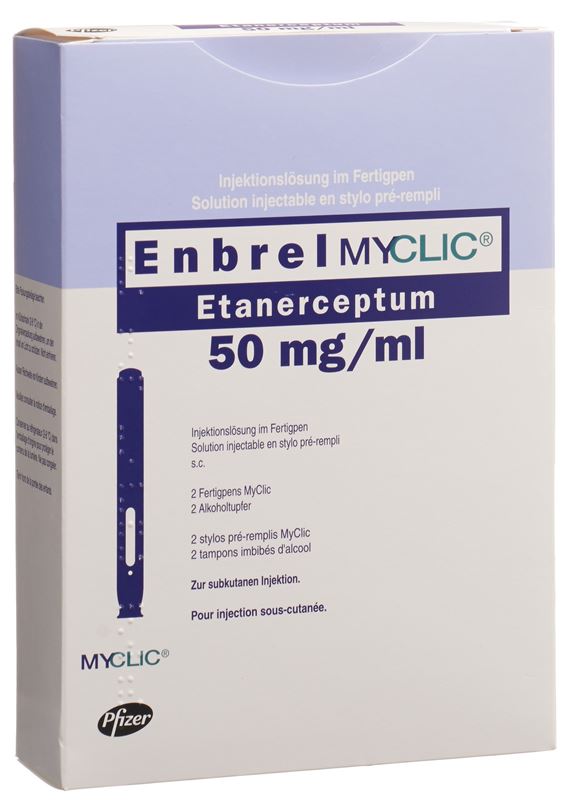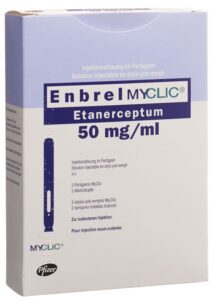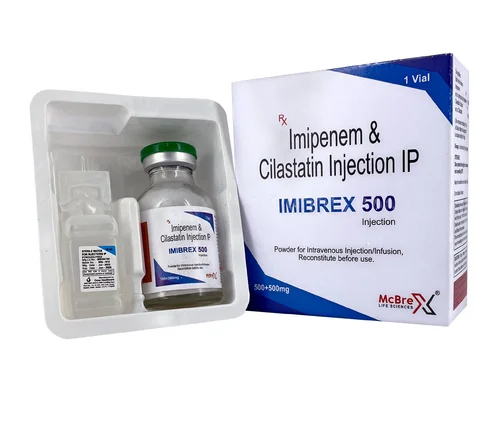
Etanercept is a biologic medication that has uses in several autoimmune diseases. It is a tumor necrosis factor (TNF) inhibitor, so it helps reduce inflammation and suppress immune responses. It is used in the treatment of conditions such as rheumatoid arthritis, psoriasis, ankylosing spondylitis, and others. This article explains the mechanism of action, administration, side effects, and much more, providing valuable information about Etanercept.
What is Etanercept?
Etanercept is a biological drug used to manage and treat inflammatory and autoimmune conditions. It works by inhibiting the action of TNF, a protein in the body responsible for inflammation. It has several brand names, including Enbrel.
Generic Name
- Etanercept
Brand Names
- Enbrel
- Erelzi
- Etacept
Mechanism of Action
Etanercept is a recombinant human fusion protein that acts as a soluble TNF receptor. By binding to TNF-alpha, it prevents the protein from interacting with its cellular receptors, thus reducing inflammatory processes. TNF is involved in various pathological conditions, i.e., in autoimmune diseases, by relieving symptoms like swelling, pain, and tissue damage.
TNF and its importance in Inflammation
Tumor Necrosis Factor (TNF) plays a central role in regulating immune responses. In rheumatoid arthritis, psoriasis, and inflammatory bowel disease, TNF is produced in excessive amounts that cause persistent inflammation. Etanercept neutralizes TNF, and it helps control these conditions and improve quality of life.
Uses of Etanercept
Etanercept has the following uses.
Rheumatoid Arthritis (RA)
Etanercept reduces the symptoms of moderate to severe rheumatoid arthritis, both in adults and children (age 2 years and older). Thus, it is used for the treatment of rheumatoid arthritis.
Psoriasis
It is used to treat moderate to severe plaque psoriasis.
Ankylosing Spondylitis
This condition causes inflammation of the spine and other joints. Symptoms are pain and stiffness in the joints. Etanercept helps in controlling these symptoms.
Juvenile Idiopathic Arthritis (JIA)
Etanercept is indicated for children with active JIA. It reduces the frequency of flare-ups and improves overall joint function.
Other Conditions
- Psoriatic Arthritis: Used for the treatment of psoriatic arthritis. It reduces joint damage and thus improves mobility.
- Inflammatory Bowel Disease (e.g., Crohn’s disease): Etanercept is sometimes used off-label for these conditions.
Administration and Dosage
Etanercept is administered by subcutaneous injection and once or twice weekly. The dose depends on the condition to be treated.
Dosing Schedule
- For Rheumatoid Arthritis, the initial dose is 50 mg twice a week and 50 mg per week for maintenance.
- For Psoriasis, 50 mg twice a week for 3 months, then reduced to once a week.
- For Ankylosing Spondylitis, 50 mg once a week.
- For Juvenile Arthritis, 0.8 mg/kg per week or dose depends on the body weight.
Administration Instructions
- It is Injected subcutaneously.
- Can be done at home after proper training by a healthcare provider.
- to avoid tissue irritation, change the injection site gradually.
Side Effects of Etanercept
Etanercept has the following side effects.
Common Side Effects
- Injection site reactions (pain, redness, swelling)
- Upper respiratory infections
- Headache
- Nausea
Serious Side Effects
- Increased risk of infections (e.g., tuberculosis, bacterial, fungal)
- Blood disorders (e.g., low white blood cell count)
- Liver problems (hepatitis)
- Heart failure and other cardiovascular issues
- risk of certain cancers, including lymphoma
Monitor for signs of infections, liver function, and heart health regularly.
Warnings and Precautions
- Infections
Etanercept suppresses the immune system. Thus, it increases the chances of infection in the user. Patients with tuberculosis (TB) and any active infections should be treated before starting their intake.
- Malignancy Risk
There is a risk of developing certain cancers, especially lymphoma.
- Heart Failure
Etanercept can worsen heart failure in heart patients.
Pregnancy and Breastfeeding
Don’t use it in breastfeeding, as it passes into breast milk. Don’t use in pregnancy unless there is no other choice.
Drug Interactions
- Other TNF inhibitors as they may increase the risk of serious infections.
- Immunosuppressive drugs like methotrexate, cyclosporine, or azathioprine can increase the risk of infections and other side effects.
- Live Vaccines, as they can interfere with the body’s ability to mount an immune response.
Popular Brand Names of Etanercept
| Brand Name | Formulation | Dosage | Indications |
| Enbrel | Subcutaneous injection | 25 mg/0.5 mL or 50 mg/1 mL | Rheumatoid arthritis, Psoriasis, Juvenile Arthritis |
| Erelzi | Subcutaneous injection | 50 mg/1 mL | Rheumatoid arthritis, Psoriatic arthritis |
| Accept | Subcutaneous injection | 50 mg/1 mL | Psoriasis, Rheumatoid arthritis |
Conclusion
Etanercept is a highly effective medication for managing and treating autoimmune and inflammatory conditions due to excess TNF. At the same time, it has potential side effects, particularly regarding infections and cardiovascular health. Always consult with a healthcare professional before starting treatment. Ensure the medication is appropriate for your individual needs.
References
- “Enbrel (etanercept) [package insert].” Immunex Corporation, 2021.
- Centers for Disease Control and Prevention. (2020). “Use of TNF Inhibitors in the Treatment of Autoimmune Diseases.” CDC.
- National Institutes of Health. (2019). “Etanercept and its Role in Rheumatoid Arthritis Treatment.”
- Food and Drug Administration. (2019). “Etanercept Approval History.” FDA.






